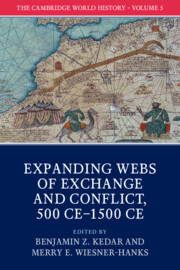Book contents
- The Cambridge World History
- The Cambridge World History
- The Cambridge World History
- Copyright page
- Dedication
- Contents
- Figures
- Maps
- Table
- Contributors
- Preface
- 1 Introduction
- Part I Global developments
- Part II Eurasian commonalities
- 7 Courtly cultures: western Europe, Byzantium, the Islamic world, India, China, and Japan
- 8 The age of trans-regional reorientations: cultural crystallization and transformation in the tenth to thirteenth centuries
- Part III Growing interactions
- Part IV Expanding religious systems
- Part V State formations
- Index
- References
8 - The age of trans-regional reorientations: cultural crystallization and transformation in the tenth to thirteenth centuries
from Part II - Eurasian commonalities
Published online by Cambridge University Press: 05 May 2015
- The Cambridge World History
- The Cambridge World History
- The Cambridge World History
- Copyright page
- Dedication
- Contents
- Figures
- Maps
- Table
- Contributors
- Preface
- 1 Introduction
- Part I Global developments
- Part II Eurasian commonalities
- 7 Courtly cultures: western Europe, Byzantium, the Islamic world, India, China, and Japan
- 8 The age of trans-regional reorientations: cultural crystallization and transformation in the tenth to thirteenth centuries
- Part III Growing interactions
- Part IV Expanding religious systems
- Part V State formations
- Index
- References
Summary
- Type
- Chapter
- Information
- The Cambridge World History , pp. 206 - 230Publisher: Cambridge University PressPrint publication year: 2015



